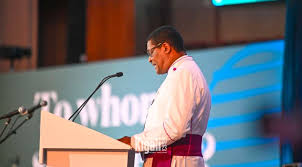Twice in the past six months, prominent Anglican theologians have written articles questioning the formularies of Global South entities: Gafcon and the Global South Fellowship of Anglican Churches (GFSA). Both articles appeared in the online edition of First Things. While First Things is a highly reputable “journal of religion and public life,” it has largely ignored the movements of global Anglicanism and in turn is seldom read by Global Anglicans. It is important now that these articles be read carefully and discussed by Anglican leaders worldwide.
The first article, written by Professors Hans Boersma, Greg Peters, and Gerald McDermott, all affiliated with Forward in Faith USA, is titled “Is the Anglican ‘Reset’ Truly Anglican?” The authors question the Anglican bona fides of GAFCON IV’s “Kigali Commitment.” I have previously written a reply to this article, and while I am somewhat sympathetic to the critique of Kigali’s expression that Scripture “is its own interpreter,” I find more problematic these critics’ claim that “without tradition as norm and guide, the canonical context and clarity of Scripture are meaningless” and that “a sola scriptura hermeneutic, which fails to recognize the Bible’s origin in the ancient Church and its authoritative interpretation by the Church fathers and creeds, opens the way to a liberal method in which every reader serves as his own authority.”
I propose as a kind of “via media” between these views the more authoritative clause from the Gafcon Jerusalem Declaration of 2008, which states:
We believe the Holy Scriptures of the Old and New Testaments to be the Word of God written and to contain all things necessary for salvation. The Bible is to be translated, read, preached, taught and obeyed in its plain and canonical sense, respectful of the church’s historic and consensual reading. (clause 2)
The Jerusalem Declaration makes clear the sole authority of God’s Word written in matters of salvation and the need for Scripture to be preached, read, marked, learned and inwardly digested – by the ploughboy and the Mothers’ Union member as well as the theologian.
The second article is titled “Anglicanism at a Crossroad,” by Mouneer Anis, the Archbishop Emeritus of Alexandria (Egypt), and Professor McDermott. This second article extends the critique of Gafcon to the Global South Fellowship and its Cairo Covenant. The fact that Archbishop Anis, one of the founders of GFSA, endorses further improvement and revision of the Cairo Covenant is, in my view, a positive sign. Here’s why.
Let me begin with a simple point: there needs to be a wider transparency concerning the Cairo Covenant. The Covenant was developed by a drafting group of prominent international Anglican leaders, including Archbishop Emeritus Robert Duncan (ACNA). It was then adopted by the Seventh Global South Conference in October 2019 and subsequently endorsed by several Provincial bodies, including the ACNA Provincial Council in June 2021. Despite the importance of this document, very few people outside these inner councils have ever read it or even seen it! It is not easily accessible (it can be found here after several clicks) and even less explained to a wider public. Just as the United States Constitution upon publication in 1787 was circulated and publicly debated before it was ratified a year later – and that with ten foundational amendments! – so also an historic instrument of Anglican identity and governance needs to be openly discussed and then “indigenized” into the life of local Anglican churches.
Secondly, the foundational doctrines of the Cairo Covenant can be further honed, and a ready tool is available. This improvement can be accomplished in a single step: adopting the Jerusalem Declaration as Section 1 of the Covenant (“Doctrinal Foundation: Fundamental Declarations”). I have no major objection to the existing section as it stands, except that its language is homiletical rather than formulaic (e.g., 200 words for the sections on Scripture, as opposed to 50 words for the Jerusalem Declaration). Returning to my first point, the current section has never been publicly vetted outside the leadership of GFSA. By contrast, the Jerusalem Declaration has earned widespread acceptance within and beyond the Gafcon movement. It has been incorporated into the Documentary Foundations of the ACNA’s 2019 Book of Common Prayer (pp. 791-793). The authors of both First Things articles cite it respectfully.
The simple step of folding the Jerusalem Declaration into the Covenant would address a third critical question: how are the two global entities, GFSA and Gafcon related to one another? In the run-up to GAFCON IV in Kigali, I argued (here and here) that these two movements are complementary, that God in His providence has gifted the Global South Fellowship with the covenantal and conciliar structure of a new Global Anglican Communion and that Gafcon has provided the theological clarity and missional passion to bring this Communion into being. Put simply, the Global South Fellowship has crafted the skeleton and Gafcon has implanted the heart of flesh of a revived, reformed and reordered Anglicanism.
For this reason, I welcome the questions being raised in the First Things articles and the willingness of Archbishop Mouneer to consider a revision to the Covenant. I would ask the Primates of GFSA and Gafcon (largely overlapping bodies) to take a step back politically, to publish the text of the Covenant for all to see, and to consolidate the gifts of the two movements. In particular, I think the historic Anglican doctrine of sola scriptura supplemented by respectful reading of the Church Fathers is well-stated in the Jerusalem Declaration and should be part of the Covenant.
“If the foundations are destroyed, what can the righteous do?” (Psalm 11:3). Are the foundations of the Global Anglican Communion secure? I think the building blocks of Gafcon and the Global South Fellowship have been laid, but edifying the emerging Communion will take interpretation of Scripture, prayer, and careful consultation.
Epiphany 2024
Photo: The Temple Mount in Jerusalem (Flickr)



